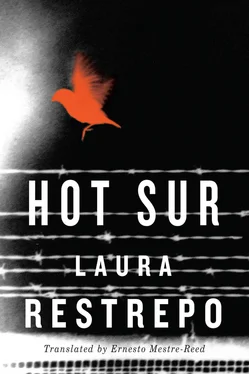Among the Latinas, there was an old woman named Ismaela Ayé who considered herself the queen mother of sorcery in the place. She was the only one who had been at Manninpox longer than Mandra X, so the two were rivals for that title, and for every other title as well, sworn enemies from day one. Ismaela Ayé had been retired for years. According to her, her decline had started when the guard confiscated a pot of holy soil; it was dirt from Golgotha, she claimed, which had been her source of power.
“Bullshit,” Dummy said, “Ismaela Ayé had slowly been cornered by Mandra X, that’s what had happened, her and her trashy, third-world hucksterism, all that caveman Catholicism and crappy devotions — what jar? what dirt from Golgotha? — as if we all just fell off the truck. Mandra X had pushed Ismaela aside, convincing the others to become a little more aware, to act rationally, not to be fucked by authority or by their own ignorance.”
With María Paz’s health crisis, Ismaela experienced a renaissance in power, gaining power by spreading rumors about Mandra X, using her evil tongue to spread curses from her cell, like a murderer of her own children who does not understand the sacred value of blood. Ismaela Ayé started reciting passages from the books of Exodus and Hebrews to cast guilt on Mandra X, and took advantage of the situation to promote the glory of living blood, the blood of Cavalry that falls on the celestial chalice, and other such hyperboles that in the end caught the attention of the other prisoners and reverberated throughout Manninpox.
At the same time, Mandra X knew that she was in trouble, that María Paz’s health crisis made her limitations all too evident. The other inmates were judging her, doubting her methods, waiting for a breakup. Perhaps Mandra X could assume her previous position again only if she got rid of Ismaela Ayé. It wouldn’t have been hard; all it would have taken was one good whack. The old woman was nothing but a dry-skinned bag of bones. But such a thing would come back to bite Mandra X in the ass, so she opted for more conciliatory measures and tried to make peace with Ismaela: “Please understand, this María Paz is no Jesus Christ incarnate; she’s just a sick girl.” But the old woman didn’t let up; she knew she had Mandra X in hot water. Nothing else to do, Mandra X’s theories and the practices of Las Nolis regarding pain as redemption and wounds as badges sounded horrible in light of the reality that María Paz was dying. Mandra X was between Scylla and Charybdis, between the negligence of those who ran the prison and the fanaticism unleashed among the inmates. She had to soften to the point of prescribing herb teas, yoga exercises, and cold sitz baths, and this began to undermine her image and influence. On the other hand, the popularity of old woman Ayé continued to skyrocket, and the Latina inmates opened their ears to her sermons, which asserted that we all are Christ figures and that all blood is sacred, that Moses sprinkled the book with such blood, that Yemaya’s blood comes from these shadows, that the lamb so sealed the covenant, that such sacrifices to this or to that were beneficial. “A vulgar jambalaya,” Dummy told Pro Bono and Rose. Ismaela’s brain was sotted and she couldn’t remember anything in detail, so she just jumbled everything up, and what she couldn’t remember she made up. What she couldn’t make up, she dreamt up. And yet, overnight she was able to win over many inmates with her stories, dragging the women into a drunkenness of superstition and supernatural thinking.
“It set everything back decades around here,” Dummy said, “a return to the fucking Middle Ages, that’s what happened here. María Paz, half-conscious amid it, and Mandra X powerless, looking on as the girl was dying in her arms and not able to do a thing about it, because all her recourses had been exhausted, and each day María Paz was getting worse, physically and spiritually. Mandra X saw her as resigned, babbling without end about her sister, Violeta, with a drooly smile, as if she herself was the first to understand that it didn’t really matter, because at that stage not even the damned divinity could save her. At last the pressure forced Mandra X to give in, and she allowed Ismaela Ayé to take charge of the patient and work her sorcery.
“She let the old woman do her thing, you know,” Dummy said. “There was no other choice.” The first thing Ismaela ordered was for María Paz to be lowered from her cot to the floor, face up, her body stiff and extended, the arms perpendicular to the torso. A crucifixion is what the old woman pulled out of her sleeve, because according to her the cross is a passageway, a door, a crossing of paths, and before the power of the cross, bad luck takes a hike, goes the other way, and stops assaulting the victim. And did it work?
“Oh yeah, it worked, worked like a fucking charm,” Dummy said. “Half an hour after lying there, crucified on the floor, María Paz has a seizure and she passes out. She goes comatose, practically dead. Responding to nothing. And the old woman? Is she feeling bad about it? Admitting her ignorance? Her guilt?”
Not at all. Ismaela Ayé remained very calm, proud, proclaiming up and down that her method had begun to take effect, that the bad luck had been cut at the legs, and that from that moment María Paz would begin to improve.
Mandra X confronted her: “You just killed her, you rotted old woman!” But it had no effect on Ismaela, who insisted that this was how it had to be, first the patient had to hit bottom before arising and coming of the depths. She had to go down into the darkness before embracing the light of the Almighty. This is what she was blabbering, with María Paz good as dead.
As things happened, the management of the prison finally did something. They had no choice but to transfer her to the hospital again, this time in a coma. Five days later, María Paz came back to the prison on her own two feet. She had come out of the coma, and although she looked weary, she was alive, even cheerful, and she told the others they had pumped her with antibiotics and anti-inflammatories enough for a horse. And forty-eight hours after returning from the hospital, she was informed that the supreme court had granted her temporary freedom until the new trial. She could go home.
This privilege was something rarely granted except under very extraordinary circumstances, such as with a reputable prisoner with deep roots in the community or an individual with an impeccable record, above all one who is prepared to put up a considerable bond. María Paz did not meet any of these conditions. Her profile, in fact, was quite the opposite. Yet, she was free to go. To go. Go home. She could walk out of Manninpox, just like that? Just like that. She was offered conditional freedom and would be under close watch until her new trial. But she could go wherever she damned well felt like it. María Paz couldn’t believe what she was hearing. How was it possible that all of a sudden they came with such news? “Get your things together,” they ordered. It was seven at night, everyone in their cell already, when the guards came to hurry her out. She couldn’t do as she was told. She sat on her cot, her bare feet on the stone floor, and she couldn’t move, her eyes fixed on nothing, wrapping herself up in her blanket as if it were a shield.
“Get the fuck outta here,” Mandra X screamed from the cell across the way. “Are you deaf? You can go.”
“But how?” María Paz didn’t quite get it. She felt nothing. Or she did feel one thing: panic. She didn’t dare move, as if it were some kind of ruse so they could say she was fleeing when they shot her in the back.
“Don’t ask questions,” Mandra X told her. “Just go. Get out.”
María Paz dressed herself, put some things in the box they had given her, although she didn’t quite get everything in. She left behind the pictures she’d put up on the wall, and they didn’t really give her a chance to get things she had lent others, or say good-bye to anyone, hugs or such. They led her out through the hallway. She was stunned and kept on her feet by the ton of medications they had given her. She looked back as if to ask something, plead to someone, as if instead of leading her to freedom, they were taking her to some horrible punishment. On seeing her, her fellow prisoners came up to the bars of their respective cells and began to applaud as she passed. At first timidly, just a few of them. Soon, all of them — a standing ovation. “You made it!” they shouted. “You did it! You fucked them! You made it, kid!”
Читать дальше












